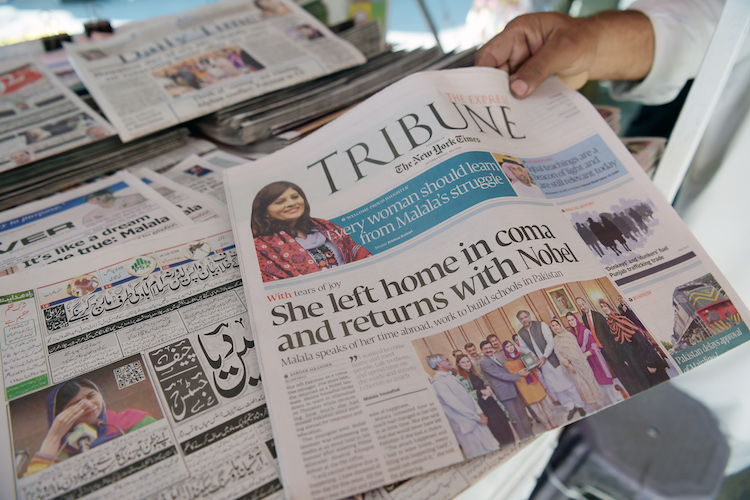Journalists are facing dangerous times as powerful military establishment takes tough action against dissenting voices

Pakistan’s vibrant newspapers are being threatened by increasing intimidation by the country’s powerful military establishment. (Photo by Aamir Qureshi/AFP)
May 4, 2018
No democracy can survive without an independent and critical press. While democracy has been in tatters ever since the disqualification of Prime Minister Nawaz Sharif last year, there have been increasing curbs on media freedom in Pakistan.
The survival of Pakistani journalists depends on the editorial policy of their media outlets. If an owner or editor dares to oppose the powerful military establishment, there can be a heavy price to pay.
Geo News, the news channel of Jang Media Group, mysteriously disappeared from cable networks a few months ago. Pakistan’s elected government and the electronic media regulator had no clue as to how a channel went off air in almost 80 percent of the country.
Over the last four and a half years, the Jang group has twice come into conflict with the military.
In 2014, Geo News presenter Hamid Mir survived an assassination attempt when he was shot several times at Karachi’s main airport. Shortly after the attack, Mir’s brother Amir appeared on Geo News and blamed then spy chief Lt. Gen. Zaheerul Islam for the attack.
Geo News was formally taken off air for a month after a complaint by the Defense Ministry. One month wasn’t enough for the military; cable operators were told to block the channel for months.
In 2016, the channel once again crossed a so-called red line drawn by the establishment when it supported PM Sharif whose children had been named in the Panama Papers. Sharif was disqualified in July 2017 over his failure to declare having accepted a salary from his son’s UAE-based firm.
Reporters associated with the Jang group had done stories against the establishment and tried to challenge judicial activism.
One of the group’s top investigative journalists, Ahmad Noorani, was attacked in broad daylight in Lahore and suffered a critical skull fracture. He is safe now but his attackers are still at large and no arrest has been made.
Shortly after being disqualified by Pakistan’s top court, three-time PM Sharif revolted against the judges and launched the “respect the sanctity of vote” movement aided by the Jang group.
The public reaction and media coverage of political events unnerved the establishment and it went after the media group. Geo News faced another unannounced ban and a financial crisis and came back on air only after its owner reached an agreement with the military.
Its employees are still waiting for their lost three months of salaries.
Geo News was told not to question the role of the judiciary in the current political instability and was strictly ordered to halt its pro-government campaign. The channel is back but it’s in self-censorship mode. Management has stopped giving space to journalists critical of the military’s role in politics.
Azaz Syed, an investigative reporter and author of The Secrets of Pakistan’s War on al-Qaeda, was told by the Jang group that he could not continue to write his political column for the group’s weekly magazine.
Dawn News, a news channel of Dawn Media Group, which was created by Pakistan’s founder Muhammad Ali Jinnah, has also gone off air in various parts of the country.
The channel has refused to surrender before the military establishment and is paying the price for reporting independently.
The Dawn group also has a history of confrontation with the powerful military.
In 2016, Dawn newspaper carried a front-page story reporting that Punjab Chief Minister Shehbaz Sharif, younger brother of former PM Sharif, had scolded military officials and told them to refrain from supporting anti-India jihadi groups or face international isolation.
The story was declared a national security breach by the military’s top brass and the government was forced to launch an inquiry to identify the sources.
The inquiry report hasn’t been made public but the government had to sacrifice its information minister and foreign affairs adviser without revealing their roles in the story.
The powerful establishment has found an in-house enemy in the Pashtun Tahaffuz Movement (Movement for Protection of Pashtuns), a group founded by 26-year-old Manzoor Pashteen, who is from the restive region bordering Afghanistan.
The group is actively advocating for missing persons who it claims were picked up by intelligence agencies. It is organizing public gathering across the country and drawing massive crowds.
The group accuses the army of aiding the “good Taliban,” a term used for military-favoring Islamist groups, and abducting those who question its role in fueling terrorism.
Military chief Gen. Qamar Javed Bajwa recently accused the Pashtun Tahaffuz Movement of holding “engineered protests.” The media was told not to cover the group’s gatherings. Journalists who refused to pay heed to the advice were threatened by anonymous callers.
It is safe to say that democracy in Pakistan is malfunctioning and may collapse if the media continues to face curbs by the military and judiciary.
Reporters Without Borders ranked Pakistan 139th in its recent Press Freedom Index. The report said Pakistan has among the most vibrant media in Asia but it is often targeted by Islamist groups and feared intelligence agencies.
Pakistan may find itself further down the index if it doesn’t ensure a safe environment for journalists.
